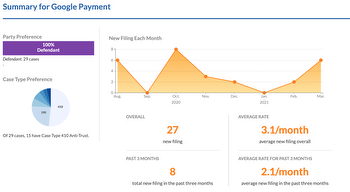Class Action Filed Against Google as Conspirator with Slot Machine Makers

On Thursday, consumers filed a class-action complaint in the Northern District of California against Google for hosting social casino phone apps, illegally profiting from gambling games, and being a co-conspirator with technology companies who developed the social casinos.
According to the complaint, for about the last ten years, “the world’s leading slot machine makers – companies like International Game Technology, Scientific Games Corporation, and Aristocrat Leisure – have teamed up with American technology companies to develop a new product line: social casinos,” which are gambling apps that mimic the “‘Vegas-style’ experience” of slot machine gambling.
The plaintiffs asserted that the social casino companies, “along with Google, Facebook, and Apple (the Platforms), have found a way to smuggle slot machines into the homes of consumers nationwide.” (Neither the slot machine makers nor Facebook and Apple are party to the lawsuit.)
The plaintiffs claimed that social casinos, like in-person slot machines, allow users to purchase a virtual “chip” in exchange for real money and then to gamble these chips on the slot machine game to win more chips and continue gambling. Allegedly, in an exemplary social casino “players purchase ‘chip packages’ costing up to $499.99. … But unlike Las Vegas slots … purchased chips and won chips alike can be used only for more slot machine ‘spinning.’” The plaintiffs averred that social casinos combine “the addictive aspects of traditional slot machines with the power of the Platforms … to leverage big data and social network pressures to identify, target, and exploit consumers prone to addictive behaviors.”
Reportedly, the social casinos must work with the Platforms to profit at a high level. The plaintiffs claimed that the Platforms “retain high-spending users and collect player data, (are) a trustworthy marketplace to conduct payment transactions, and (provide) the technological means to update their apps with targeted new content designed to keep addicted players spending money.” Additionally, the plaintiffs contented that by using Google “for distribution and payment processing, the social casinos entered into a mutually beneficial business partnership. In exchange for distributing the casino games, providing them valuable data and insight about their players, and collecting money from consumers, Google (and the other Platforms) take a 30 percent commission off of every wager, earning them billions in revenue.” The plaintiffs compared this to traditional casinos, where the “house” takes only 1 to 15 percent.
Furthermore, the plaintiffs asserted that social casinos are illegal under the gambling laws of many states. Nevertheless, Google and the other Platforms purportedly continue to host and participate in social casinos despite their illegality, according to the plaintiffs. As a result, the plaintiffs claimed that Google and the other Platforms are “all liable as co-conspirators to an illegal gambling enterprise,” for providing access to customers, hosting their games, and processing payments.
The plaintiffs accused Google of violating the Racketeer Influenced and Corrupt Organizations Act and California’s Unfair Competition Law, as well as for racketeering activities and collection of unlawful debts.
The plaintiffs seek class certification and for the plaintiffs and their counsel to represent the class; restitution; declaratory and injunctive relief; and an award for damages and other costs. The plaintiffs are represented by Edelson PC.
This lawsuit comes after a wave of lawsuits against gambling games and social casinos and their hosting platforms, like Google. For example, Google was sued over DoubleU Games, and Zynga Games’s gambling games. Additionally, a similar lawsuit to the instant action was filed against Apple that accused it of being a co-conspirator for social casinos.





































